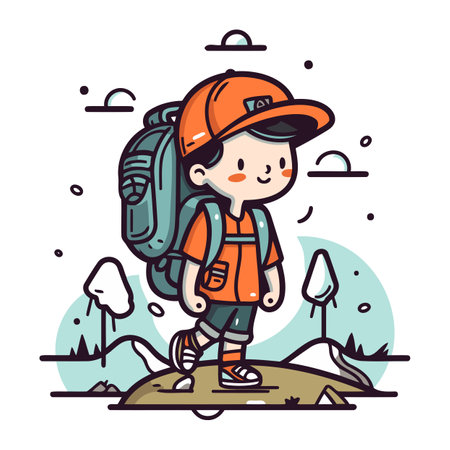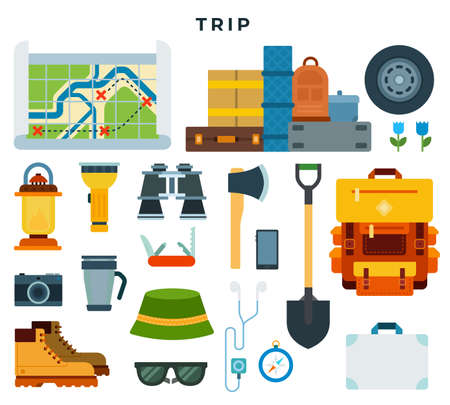1. Introduction: Finding the Right Pack for Your Adventure Style
If youre heading into the great outdoors, your backpack isnt just a bag—its your home base. Whether youre a casual weekend camper or a hardcore hiker tackling multi-day treks, choosing the right backpack can make or break your trip. Different camping styles demand different features, and knowing what to look for is key to comfort, convenience, and safety.
Why One Size Doesn’t Fit All
Backpacks come in all shapes and sizes, each designed with specific users in mind. A day hiker might only need room for snacks, water, and a light jacket. But if youre heading out on a week-long backcountry adventure, you’ll need space for food, gear, shelter—and more importantly, a pack that distributes weight properly to avoid fatigue or injury.
Matching Your Pack to Your Camping Style
Here’s a quick breakdown of common camper types and what they typically need from their backpacks:
| Camper Type | Trip Length | Key Features Needed | Recommended Pack Capacity (Liters) |
|---|---|---|---|
| Weekend Warrior | 1-2 nights | Lightweight, easy access pockets, hydration compatibility | 30–50L |
| Family Camper | 2–4 nights at established campsites | Extra storage space, comfort padding, organization compartments | 50–65L |
| Backcountry Explorer | 3+ nights in remote areas | Load-bearing frame, weather resistance, high durability | 65–80L |
| Hardcore Thru-Hiker | Weeks or months on trail | Ultralight design, modular components, efficient load transfer system | 45–65L (ultralight style) |
The Bottom Line: Fit and Function Matter Most
No matter what type of camper you are, the most important factor is how well the backpack fits your body and supports your adventure goals. Look for adjustable straps, proper back ventilation, and weight distribution systems that reduce strain on your shoulders and hips. The right pack doesn’t just carry your gear—it carries you through the journey.
Coming Up Next…
In the next sections of this guide, we’ll break down top-rated backpacks for each camper type—so whether you’re gearing up for a quick overnight or prepping for a month on the Pacific Crest Trail, we’ve got you covered.
2. Weekend Warriors: Best Backpacks for Short Getaways
If youre someone who loves quick weekend escapes to a nearby state park or a cozy overnight at your favorite campsite, you probably don’t need a bulky, expedition-style backpack. For casual campers and short-term adventurers, lightweight and comfortable packs are the way to go. These bags offer just enough room for the essentials—think sleeping bag, snacks, extra layers—without weighing you down.
What Weekend Warriors Should Look For
- Lightweight Design: You want something easy to carry, especially if youre hiking short distances.
- Comfortable Fit: Padded straps and breathable back panels make all the difference on even a short trail.
- Easy Access: Quick-access pockets for water bottles, snacks, and your phone are super handy.
- Durability: Even weekend trips can involve rough terrain or unexpected weather, so look for strong materials.
Top Backpack Picks for Weekend Warriors
Here’s a quick comparison of some of the best backpacks tailored for short getaways:
| Backpack | Capacity | Weight | Key Features | Best For |
|---|---|---|---|---|
| Osprey Daylite Plus | 20L | 1.19 lbs | Padded laptop sleeve, hydration compatible, ventilated back panel | Day hikes & light overnights |
| REI Co-op Flash 22 Pack | 22L | 14 oz | Removable hipbelt & sternum strap, hydration reservoir sleeve | Campsite strolls & urban exploring |
| Deuter Speed Lite 24 | 24L | 1.6 lbs | Slim fit, compression straps, breathable mesh shoulder straps | Active day hikes & minimal gear trips |
User Tips for Short Trips
- Pack Smart: Stick to the basics—water, snacks, first aid kit, headlamp, and layers depending on the weather.
- Try Before You Buy: If possible, visit your local outdoor store to try on different packs with some weight added.
- Add a Hydration Bladder: Most weekend-friendly packs have space for one and it makes staying hydrated much easier.
A Note on Style and Functionality
You don’t have to sacrifice looks for performance. Many lightweight packs come in fun colors and sleek designs that look great whether youre hiking through the woods or grabbing coffee on your way home. Choose a style that fits your personality and supports your comfort out on the trail.
The right backpack can turn an average weekend into a memorable mini-adventure. With these options and tips in mind, you’re ready to pack up and hit the trail without overthinking it.

3. Backcountry Enthusiasts: Packs That Balance Capacity and Comfort
If youre the type of camper who loves venturing deep into the wilderness for several days at a time, you need a backpack that can keep up. Backcountry enthusiasts require packs that offer high-capacity storage, rock-solid durability, and excellent support to handle long treks with heavy loads. Heres a look at some top-rated backpacks designed to go the distance without breaking your back.
What to Look For in a Backcountry Pack
- Capacity: Look for packs in the 60L–80L range to carry food, gear, shelter, and clothing.
- Support: A well-padded hip belt and adjustable suspension system are essential for weight distribution.
- Durability: Rugged materials like ripstop nylon and reinforced stitching stand up to rough terrain.
- Accessibility: Multiple compartments and external attachment points help keep your gear organized and easy to reach.
Top Backpack Picks for Backcountry Camping
| Backpack | Capacity | Weight | Key Features | Best For |
|---|---|---|---|---|
| Osprey Aether 70 / Ariel 65 | 70L (Men) / 65L (Women) | 5.4 lbs | Custom-fit harness, AirScape back panel, removable top lid | Multi-day trips with heavy loads |
| Gregory Baltoro 75 / Deva 70 | 75L / 70L | 5.8 lbs | Award-winning suspension, ventilated back panel, rain cover included | Tough terrain and variable weather |
| Granite Gear Crown 3 60 | 60L (expandable) | 2.4 lbs | Ultralight design, removable frame sheet, modular components | Lighter packers who still want durability |
User-Friendly Features That Matter
- Padded hip belts with zip pockets for snacks or phones.
- Sternum straps with emergency whistles.
- Hydration reservoir sleeves and ports for easy water access.
Pro Tip:
If youre hiking in hot or humid climates, look for a pack with a breathable mesh back panel to reduce sweat buildup on long hauls. The Osprey’s AirScape system is especially great for airflow while maintaining structure.
4. Ultralight Trekkers: Minimalist Rigs for Maximum Efficiency
If youre the kind of camper who shaves down your toothbrush to save weight, then ultralight backpacks are your bread and butter. Designed for thru-hikers, long-distance backpackers, and hardcore minimalists, these packs prioritize weight savings without sacrificing essential features. Lets dive into some top picks that balance function and feather-light design.
What Makes a Pack “Ultralight”?
Ultralight backpacks usually weigh under 2.5 pounds and have a capacity between 40–60 liters. They skip the bells and whistles—no heavy-duty frames, thick padding, or extra compartments. Instead, they focus on core essentials like comfortable straps, water-resistant materials, and smart storage layouts.
Top Ultralight Backpack Picks
| Backpack | Weight | Capacity | Best For |
|---|---|---|---|
| Hyperlite Mountain Gear 2400 Southwest | 1.98 lbs | 40L | Thru-hikes & wet conditions |
| Zpacks Arc Blast 55L | 1.45 lbs | 55L | Long-distance treks with minimal gear |
| Gossamer Gear Mariposa 60 | 2 lbs | 60L | Ultralight hikers who want some extras |
| ULA Circuit | 2.4 lbs | 68L | Multi-day hikes with a bit more comfort |
Packing Tips for Ultralight Backpackers
- Weigh everything: Use a kitchen scale to track your gear weight down to the ounce.
- Simplify your shelter: Consider tarps or ultralight tents made from Dyneema fabric.
- No redundancy: Every item should serve more than one purpose when possible.
- Practice before you go: Test pack your gear and go on short trips to refine your loadout.
The Trade-Offs You Should Know About
While ultralight packs help you move faster and longer, they come with trade-offs. Less padding means less comfort on heavy-load days, and fewer compartments can make organization tricky. Also, many ultralight packs arent as durable as traditional ones—especially if youre bushwhacking or scrambling over rocky terrain.
The Bottom Line for Ultralighters
If you’re counting every ounce and every mile, an ultralight backpack is your best trail companion. Just be sure it fits well and matches the rest of your lightweight setup. With the right system in place, youll cover more ground with less strain—exactly what minimalist trekkers aim for.
5. All-Season Adventurers: Versatile Packs for Changing Conditions
If youre the type of camper who’s out exploring no matter the season—whether it’s blazing hot, pouring rain, or snowing sideways—you need a backpack that can handle anything Mother Nature throws at you. All-season adventurers require packs that are tough, weather-resistant, and adaptable to various terrains and climates. Here are some top picks that strike the perfect balance between durability, comfort, and versatility.
What Makes a Backpack All-Season Ready?
- Weather Resistance: Look for water-resistant fabrics like ripstop nylon or polyester with DWR (durable water repellent) coating.
- Modular Storage: Extra compartments or removable pouches help with organizing gear for different seasons.
- Comfort in Any Climate: Ventilated back panels for summer heat and padded straps for heavier winter loads.
- Hydration Compatibility: Staying hydrated is key whether youre sweating in July or trekking through snow in January.
Top Picks for Year-Round Backpacks
| Backpack | Capacity | Best For | Weather Features |
|---|---|---|---|
| Osprey Atmos AG 65 | 65L | Multi-day hikes, varied climates | Rain cover included, breathable mesh back panel |
| The North Face Banchee 50 | 50L | Lightweight all-season trips | DWR finish, good ventilation system |
| Gregory Baltoro 75 | 75L | Heavy loads, winter camping | Water-resistant zippers, weather-shield hip belt pocket |
| Deuter Aircontact Lite 60 +10 SL | 60L +10L extension | Spring to winter trekking | PFC-free water repellent, adjustable ventilation system |
User Tips for All-Season Use
- Add a Pack Liner: Even with water-resistant packs, an internal liner keeps your gear dry in heavy rain or snow.
- Layer Smart: Use compression straps to adjust load size depending on how many layers youre carrying each season.
- Watch the Weight: Winter gear adds bulk—choose a pack with reinforced frames for better support.
No matter if you’re hiking through desert heat or snow-covered trails, having the right backpack makes all the difference. These versatile picks ensure you’re prepared for whatever adventure lies ahead—all year long.
6. Final Thoughts: Picking the Pack That Matches Your Wilderness Goals
Finding the right backpack for your outdoor adventures isnt just about size or color—its about matching your gear to how you camp. Whether youre hitting the trail for a quick weekend getaway or heading deep into the backcountry for a multi-day hike, your backpack should support your goals, not weigh them down.
Key Features to Consider
Before you buy, take a close look at these essential features. They can make or break your camping experience:
| Feature | Why It Matters |
|---|---|
| Capacity (Liters) | More space means more gear. Choose based on trip length and how much you pack. |
| Weight | Lighter packs reduce fatigue, especially on longer hikes. |
| Frame Type | Internal frames are common and provide better balance; frameless packs are lighter but less supportive. |
| Fit & Adjustability | Look for adjustable straps, torso length options, and padded hip belts for comfort. |
| Pockets & Organization | Helps keep gear accessible and organized on the trail. |
| Weather Resistance | A water-resistant or rain cover-ready pack is crucial in unpredictable weather. |
Tips Based on Camping Style
Weekend Warriors
If youre mostly out for one or two nights at local parks or campsites, go for a pack between 30-50 liters. Look for easy-access compartments and comfort-focused features like padded straps and ventilated back panels.
Family Campers
You’ll need more room for shared gear and food. A 60-70 liter pack offers enough capacity without overdoing it. Prioritize organization, external pockets, and weight distribution systems to help share the load.
Backcountry Explorers & Hardcore Hikers
If youre venturing off-grid for several days or tackling rugged terrain, choose a high-capacity (70+ liters), durable backpack with excellent support and weather protection. Weight matters here—go as light as possible without sacrificing durability.
Your Final Choice: Match Your Backpack to Your Adventure Goals
The best backpack isn’t always the biggest or most expensive—it’s the one that suits how often you camp and where you’re going. Think about your usual trips: Are they short and sweet, or long and wild? Do you value comfort over ultralight speed? Answering these questions will guide you to the right pick. And remember: try it on if you can before buying—fit is everything when youre miles from the nearest trailhead.


